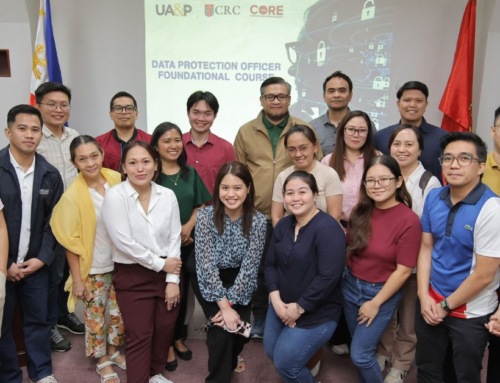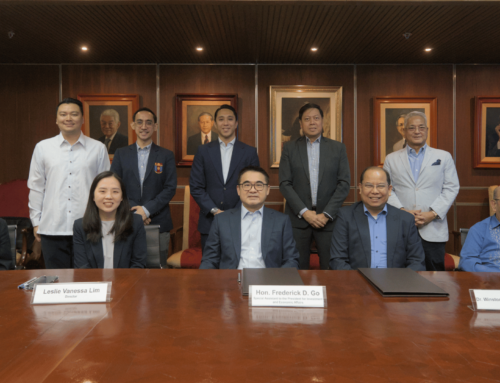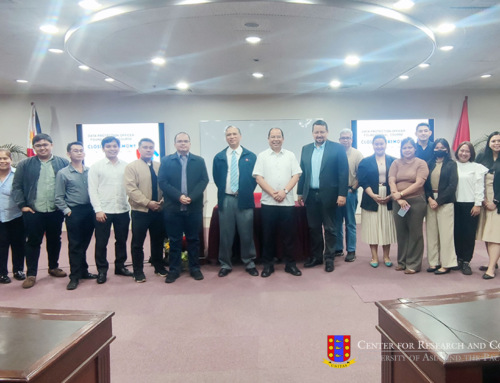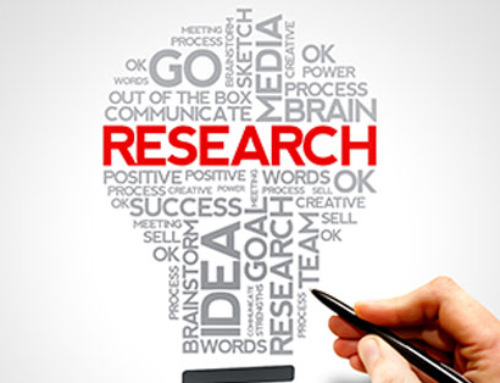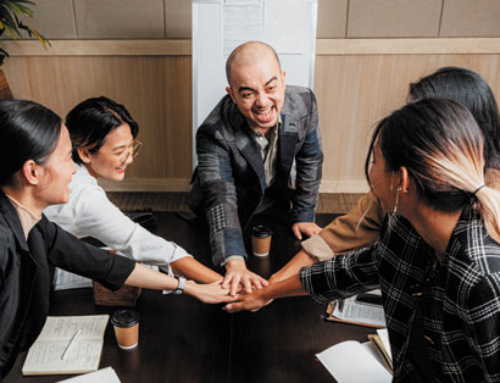CRC Consultant Cyrus Paolo Buenafe, who also chairs the UA&P Department of Information Science and Technology, talks to Consulting Clinical Psychologist and UP Assistant Professor Anna Cristina Tuazon, PsyD., about how professionals can stay productive under “Work From Home” arrangements
Ortigas, Pasig — If professionals want to maintain your productivity under work-from-home setups which have become the norm in the wake, Consulting Clinical Psychologist and UP Assistant Professor Anna Cristina Tuazon, PsyD. says it’s important for these professionals to set clear boundaries between their work and home life, and for them to work within their limits. And it’s all the more important because professionals in particular are psychologically vulnerable under such crises.
Speaking with “IST Presents,” a new series of webcasts hosted by the University of Asia and the Pacific’s Department of Information Science and Technology (IST) Dr. Tuazon surprised host (and UA&P IST Department Chair) Cyrus Paolo “Chipi” Buenafe when she said that middle-aged professionals are actually very vulnerable to the stresses of “Work From Home” (WFH) arrangements.
“Their plate is usually full, if not overloaded.”
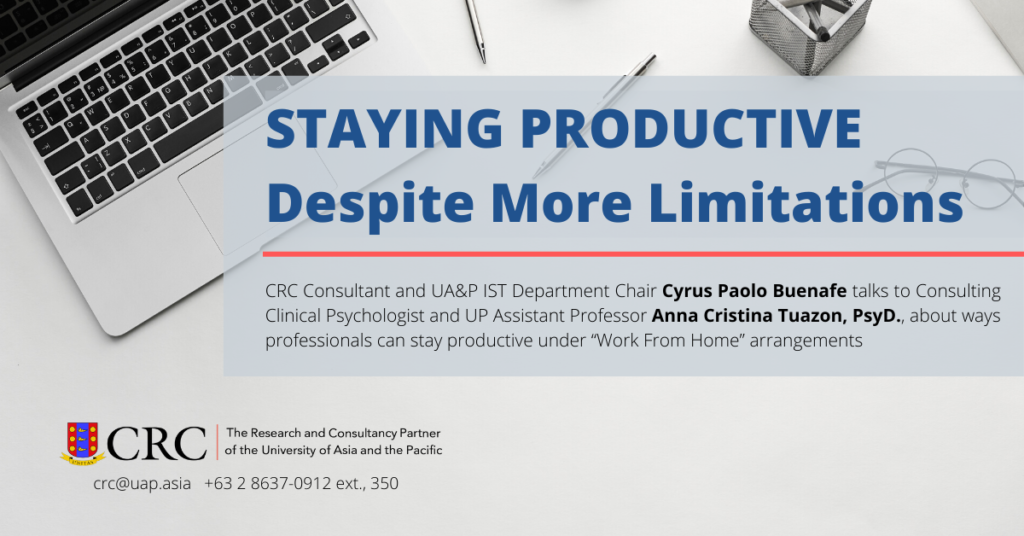 When asked about the psychological struggles faced by professionals under the current quarantine conditions, she noted that “When it comes to disaster situations in general, […] the most vulnerable – aside from children and elderly, who are usually [physically] vulnerable – are those who are around the age of 40. Because some of them they already have their own families to take care of and worry about, [but they] have aging parents to take care of as well. Especially [during] this pandemic, one of our biggest stressors is “I have… retired parents, and I worry[…] for their health and safety. Juggling all of that [right] now, [when something as simple as getting groceries, or banking, or paying your bills takes most if not all of the day], is really such a herculean task… so yeah their plate is usually full, [if not] overloaded.”
When asked about the psychological struggles faced by professionals under the current quarantine conditions, she noted that “When it comes to disaster situations in general, […] the most vulnerable – aside from children and elderly, who are usually [physically] vulnerable – are those who are around the age of 40. Because some of them they already have their own families to take care of and worry about, [but they] have aging parents to take care of as well. Especially [during] this pandemic, one of our biggest stressors is “I have… retired parents, and I worry[…] for their health and safety. Juggling all of that [right] now, [when something as simple as getting groceries, or banking, or paying your bills takes most if not all of the day], is really such a herculean task… so yeah their plate is usually full, [if not] overloaded.”
When asked what practical things professionals can add to their selfcare toolbox while working at home, so that they can stay productive, Dr. Tuazon reiterated the need for compartmentalizing work, and for knowing one’s limits.
Clarifying the limits of work
Compartmentalizing work is nothing new, Dr. Tuazon notes, for those who were already working from home before the pandemic. But for those who shifted to an online mode because of the COVID-19 crisis, clarifying those limits in the workplace context can be very important
“Nowadays, everybody expects a quick response to emails; everybody’s multitasking; everybody’s having multiple meetings at the same time. So actually, we’re doing more work than prior to the pandemic,” she says.
“It’s very very important to set time limits to work[,] especially for those who are working from home,” she goes on. “There’s a big tendency for work to bleed-in 24/7, like bosses who ask for meetings at 8PM on a Saturday night, and things like that. It’s very important to set limits. [And] if you’re in a leadership position, it’s [very] important[…] for you to set that tone, because employees don’t have the ability to do that.
If you’re an employee and you have a good relationship with your employer then it would be good to have this discussion. For example, [if an email comes in on a weekend, it’s important to set limits and say] “unless it’s a medical emergency I will respond on Monday.”
Working under more limitations.
While Dr. Tuazon feels that compartmentalizing work might already be a familiar concept for most professionals, she also cites the importance of acknowledging one’s limits, and notes that this might be a new idea in some workplaces – although one that could be key to maintaining office productivity.
“The] thing that people might not realize,” she says, “is that you cannot expect yourself to be productive for 8 hours in a day. If you could aim to do 4 hours – I know it sounds odd, especially for for bosses – but if [you…] plan your day so that there are four hours of focused work, that’s actually way more productive.
People have been experimenting with this in their teams… If you just focus on just four hours of productive work – four hours where [you] focus, lock the doors, set aside some time away from the kids – then I suspect [your] productivity will be higher than you’d expect [if you were working] eight hours and you’re struggling.
Remember everything you have to do – you have to do your groceries, you have to do your laundry, you have to help your kids with their homework or their online lesson… that’s why I think a whole 4 hour workday is way more productive. That’s just understanding your own limits. If nothing else, all your strategies must emanate from the fact that you’re working [under more] limitations.
Because if you try to go beyond your limitations, your frustration and resentment will go up, your temper will be shorter, your sense of depression and isolation and loneliness and hopelessness … that’s going to increase end then guess what? Then you can’t work for the rest of the day.
It works for self-care and it works for productivity. It’s not either or. Mental health is not the opposite of workplace productivity. [It’s the same with those in] school. Do one task in a day; don’t take five subjects the way you used to do before.
Trying to use the same… timetable [as the one you were using months ago], that’s wrong. That’s going to set you up to fail and then you’re going to feel bad, and if [you] have mental health issues, [you’re] going to feel weak, or not capable, or [feel that you’re] to blame… let’s remove that. Cut it down to half, cut it down to a fourth if you can.”
“People are accepting the support.”
Chipi Buenafe’s full interview with Dr. Tuazon also included a number of other topics on the Psychological impact of the crisis, including a long discussion on students and their difficulties the quarantine, given that students today have grown up under a much more intensely competitive environment.
Dr. Tuazon also talked at length about how the traumatic experiences of the last few years have led to an appreciation of the need for psychological health, and for the psychological health services. Mental health awareness has stepped up, she says. “People are taking that up, people are accepting the support.”
“A real trauma milestone for the Philippines was when typhoon Yolanda struck, back in 2014. They realized that it’s not a sign of weakness [to] need support; it’s a sign of how extraordinary the circumstances are.” • Remi E. De Leon/CRC
———————————————
The Center for Research and Communication is a research and consultancy group that partners with the University of Asia and the Pacific (UA&P), drawing upon UA&P’s considerable human and knowledge resources to meet the research needs of businesses and development agencies throughout the Philippines. To find out more about CRC’s partnership with the UA&P Department of Information Science and Technology, and for any questions about the IST Presents Webcast series or the interviews already up on YouTube, you can contact Communications Officer for Research, Mr. Remi de Leon, by email at [email protected] .
The rest of the interview with Dr. Tuazon can be found at https://www.youtube.com/watch?v=5ocX7pYmkdQ&t=298s ; the rest of the interviews can also be viewed on YouTube, or heard on spotify at https://open.spotify.com/show/4apK3T9r1Oqf3KFDz1JDWv?si=MIqHMjNITpWgZdpU3GFJPA.

